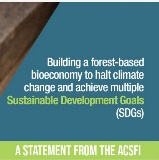Private sector calls for building a forest-based bioeconomy to halt climate change and achieve multiple Sustainable Development Goals

Belem, Brazil 19 October 2021 – “Forest-based industries make an essential contribution to net zero emission targets, to which many businesses have committed in line with the Paris Agreement on Climate Change,” said the FAO’s Advisory Committee on Sustainable Forest-based Industries (ACSFI) today in a statement released at the World Bioeconomy Forum in Bélem (Brazil).
The ACSFI called upon FAO, its member countries, the private sector and other stakeholders to jointly strengthen their commitment to building back better in a post-COVID-19 world, through fostering the ongoing development of a forest-based bioeconomy.
“Trees and forests are fundamental for a growing bioeconomy as they provide feedstock for a multitude of products, some are traditional, many others are emerging,” stated Sven Walter, Secretary of the ACSFI, during the Forum.
In the statement, ACSFI members committed to strengthen and further recognize the crucial role played by forests, active forestry and forest products in the transition towards a functioning, sustainable circular bioeconomy. This role includes product substitution and the carbon storage of forest ecosystems as well as wood products who are acting as major carbon sinks, reducing greenhouse gases in the atmosphere and thus helping mitigate the environmental impacts of construction and infrastructure development projects.
“Increasing the sustainable use of bio-based products to replace fossil-fuel based products will be an essential component of decarbonizing our society,” said Ross Hampton, Chair of the ACSFI.
The sustainable use of forest resources will in fact contribute to a green recovery and the opportunity to decarbonize multiple economic sectors. It can play a crucial role in safeguarding human health by increasing food security and maintaining biodiverse and resilient ecosystems.
To fully harnessing the potential and promise of sustainable forest use, it is also required that:
- sustainable resource use is the overarching guiding principle;
- policy and investment decisions are underpinned by accurate data, with a focus on the assessment of supply and demand dynamics to ensure the establishment of sustainable consumption and production patterns and that upper thresholds of bioeconomy expansion are not exceeded;
- regional disparities are ameliorated. More investment is needed in forest-based construction, manufacturing, energy, agri-food systems and services;
- financing to encourage the sustainable use of forest products is dovetailed with other financing to augment efforts to mitigate climate change and avert biodiversity loss and land degradation;
FAO and its ACSFI members are committed to work with partners to address key challenges such as developing an efficient wood cascading use; and strengthening international cooperation among scientific, industrial and financial institutions.
Read here the full Statement.

